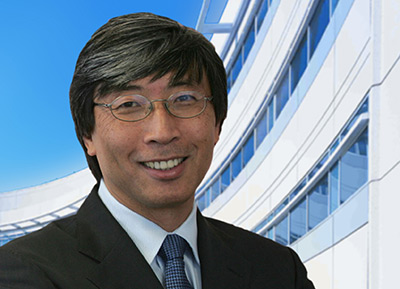Patrick Soon-Shiong empathizes with fellow cancer researchers who struggle to keep pace with medical advances that seem to be coming fast and furious.
“It’s impossible for clinical oncologists to keep up in real time,” Soon-Shiong told a gathering Feb. 5 at The Scripps Research Institute, the latest presentation in the Helen Edison Lecture series themed on cancer. “It’s such an exciting place to be, this path we are now on.”
Truth is, it’s Soon-Shiong who’s been making a two-decade whirlwind of scientific breakthroughs in the fields of genomics (the study of DNA in organisms) and proteomics (the study of proteins), essentially breaking down the “chemical poisons” that form cancer cells and allow them to spread unabated.

Patrick Soon-Shiong
Soon-Shiong’s appearance was co-presented by UC San Diego Extension and the Center for Ethics in Science & Technology.
After thousands of years, no cure has yet been found for the disease that led to the deaths of nearly 600,000 Americans alone last year, almost 1,600 per day, according to the American Cancer Society. Cancer remains the second most common cause of death in the U.S., accounting for nearly one of every four deaths.
“The war against cancer is a war against time,” said Soon-Shiong. “We’re winning that war. We’re on the path to the cure – and proteomics will get us there. ... We’re crossing scales of enormous complexity.”
Among his many advances, Soon-Shiong has built what he termed “a national information highway,” known as “Big Data,” that tracks cancer’s genomic path in untold thousands of patients.
“Cancer must be re-classified as a molecular footprint rather than simply organ-related,” he told his rapt audience.
The L.A.-based, Chinese-born, South African-raised surgeon and cancer researcher has built an estimated $9 billion fortune as a drug inventor and entrepreneur. He said he’s not only seeking a cancer cure with his global research, he’s fighting against “dogma” of firmly held beliefs in the medical world.
One such dogma involves the use of chemotherapy drugs in maximum doses.
“You don’t die from the primary, you die from the metastases,” said Soon-Shiong. Moreover, he added, “You don’t inherit cancer, you get it from something.”
Among Soon-Shiong’s other observations:
-
On criticism of the Federal Drug Administration: “I’m the strongest and staunchest supporter of the FDA. I won their trust. It’s easy to bash the FDA, (but) they are there to protect us.”
-
On entrenchment within medical and pharma fields: “It’s going to take 10 years for all that dogma to change.”
-
On the near-future accessibility of genome sequencing: “It’s the data that’s complex, not the process. You can do a patient’s genome sequencing now for $1,000. Soon, it will be $100.”
-
On his most recent patent: “We just got a patent for an H1N1 (virus) antibody. I thought to myself, ‘What’s going to wipe us out as a human race? Clearly, a pandemic could. So this is very real.”
The next installment of the “Overthrowing the Emperor of All Maladies” series will feature acclaimed author Siddhartha Mukherjee, Tuesday, Feb. 25, 7 pm at UC San Diego’s Price Center West Ballroom. His book, “The Emperor of All Maladies,” was awarded the Pulitzer Prize in 2010.